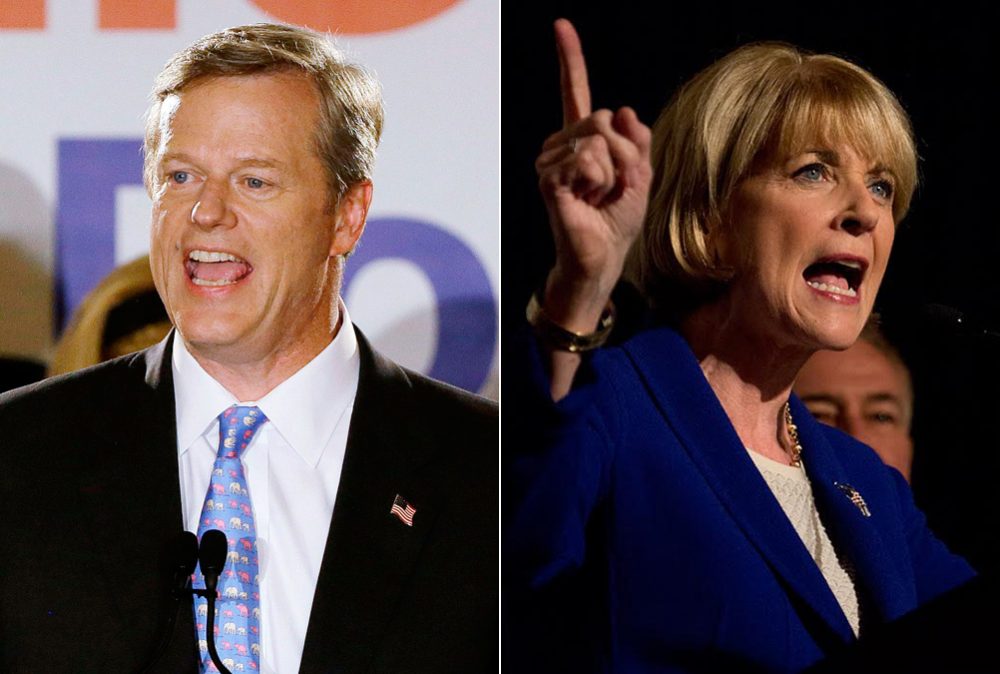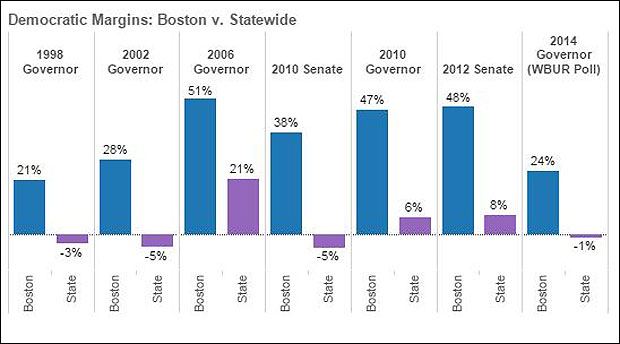Advertisement
WBUR Poll: Baker Keeps Slim Lead Over Coakley
Resume
The final WBUR pre-election tracking poll shows the race for governor remains a virtual tie, with Republican Charlie Baker leading Democrat Martha Coakley by 1 point.
Baker's 43-42 lead in the WBUR survey is small (well within the margin of error) and unchanged from last week, but Steve Koczela, president of The MassINC Polling Group, which conducts surveys for WBUR, says the trends are tilting in Baker's favor.
"Collectively, the polls look like Baker ... has some size of a lead," he said. A Boston Globe poll published Friday showed Baker with a 9-point lead and a UMass Lowell survey published Monday evening showed Baker with a 4-point advantage.
But the polls are bouncing around a bit. Also on Monday, a YouGov/New York Times/CBS News poll gave Coakley a 4-point edge.
Still, Koczela says Baker seems to be building momentum with the key groups he needs for a victory — unenrolled voters, women and urbanites.
In fact, even in Boston, a traditional Democratic stronghold, Baker is doing better than expected.
Among Boston poll respondents, he trails Coakley by 24 points. That's a huge numerical advantage for the attorney general, but Democrats usually give Republicans a worse thrashing in Boston. Four years ago, Baker lost the city by 47 points to Gov. Deval Patrick.
So, Koczela says, a 24-point Democratic edge is actually a troublesome sign for Coakley.
"A 24-point margin is trouble for Martha Coakley cause Democrats rely on votes from cities," he said. "Democrats in recent years have run up 35-, 40-, 45-point leads in Boston."
The current Coaklely lead in Boston is reminiscent of past Republican victories. In 1998, Republicans lost Boston by 21 points and Paul Celucci won the race. And in 2002, when Republicans lost Boston by 28 points, Mitt Romney captured the corner office.
"So that's another sort of tea leaf that I'm looking at when I say the polls as a whole show probably a slight tilt toward Baker," Koczela said.

Perhaps even more worrisome for Democrats is that among white voters, who tend to participate more regularly in midterm elections, Coakley's lead in Boston shrinks to 5 points.
Poll respondent Ken DeMarco, a 60-year-old retired snow plow driver who lives in East Boston, symbolizes Coakley's struggle with white Bostonians. DeMarco is a registered Democrat, but says Coakley is far too liberal for his taste.
"Coakley mentioned giving drivers licenses to illegals, that's not a good thing," he said.
DeMarco says he'll vote for Baker on Nov. 4.
"I like the fact that he's gonna lower taxes, he's gonna increase jobs, and he's gonna be strong on immigration," he said.
While the poll suggests white Bostonians have mixed feelings about Coakley, it also indicates people of color are solidly in her corner. Among minorities in Boston, Coakley beats Baker by 57 points (71 -14).
Cheryl Creech, a registered Democrat from Hyde Park, says she's noticed Baker reaching out more to black voters, spending more time in her neighborhood this campaign season, but she's not convinced.
"Lip service doesn't fly with me," Creech said. "I don't see anything Charlie Baker has done to favor women, number one. Women of color, number two, I'm voting an estrogen ticket ... we deserve our chance, we got some good women running."
Creech says she's impressed by Coakley's record as attorney general. Plus she says Baker comes across as "real arrogant."
"He's a Republican, that doesn't weigh in my favor automatically. I'm a woman of color," Creech said.
And while Coakley may have Creech's vote, she's struggling to maintain the support of other women across the state.
Women were supposed to be her foundation, but they've become her pain point.
As we reported in a previous post on Poll Vault, Coakley needs to turn the gender gap into "a gender gulf" to win. In the last few weeks, she's done the opposite. The WBUR surveys shows Coakley's support with women is deteriorating. Six weeks ago, she led Baker by 20 points; now, her lead has shrunk to 9 in this group.
Mary McGaugh, a registered Democrat from Dorchester, says both the Republican and the Democratic candidate seem competent, but she's leaning toward Baker.
"I like his manner. Anything I've seen him do, I thought he did well," she said, referring to his work as the state's health and human services secretary.
Sentiments like McGaugh's are a bad omen for Coakley.
"Democrats have counted on having a big lead among women," Koczela, the pollster, said. "[But] her lead among women is smaller than Deval Patrick got, smaller than [U.S. Sen.] Ed Markey got, smaller than [U.S. Sen.] Elizabeth Warren got."
Many details in this latest poll don't look promising for Coakley, but there are a couple bright spots for the attorney general. Throughout the fall, she's struggled to win over Democrats; now, with a week before Election Day, her support seems to be inching up. This latest poll shows 71 percent of Democrats saying they'll vote for her, compared to 66 percent a week ago.
"Unenrolled voters is where there's the biggest block of undecideds left," Koczela said. "There's a few demographics that look like they should be open to [Coakley], so if she can find a way to break out of the doldrums that she's been sailing in, she still has a pathway to gain some more votes."
The WBUR survey finds the three independent candidates — Scott Lively, Jeff McCormick and Evan Falchuk — are still failing to gain much traction; collectively, they're capturing 7 percent of the vote.
While none of the independents is posing a stiff challenge to the two front-runners, Koczela says in a race this tight, if one candidate loses by a point or two, you can expect to see some harsh finger pointing the day after the election.
The telephone survey of 494 likely voters was conducted Oct. 22-25. It has a margin of error of 4.4 percent. In addition to the usual statewide sample, this WBUR survey tracked the city of Boston in detail with an additional 206 likely voters. The margin of error for the Boston figures is 6.7 percent.
- Crosstabs: Statewide, Boston sample
This segment aired on October 28, 2014.
